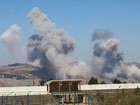Spotlight
The Lebanese government survived Wednesday a vote of confidence proposed by Free Patriotic chief Jebran Bassil during a plenary session in Parliament.
Sixty-nine MPs gave a vote of confidence to the government, nine FPM MPs voted against it, and four MPs abstained.
 Full Story
Full Story
U.S. envoy Tom Barrack has described the Lebanese Central Bank’s decision to bar banks and brokerages from dealing with the Hezbollah-affiliated Al-Qard Al-Hasan financial institution as a “step in the right direct by the Lebanese government.”
 Full Story
Full Story
As lawmakers convened Wednesday for the second day in Parliament to debate the government's policies, Prime Minister Nawaf Salam vowed that the government will continue working on extending the state’s authority north and south of the Litani river.
"I have listened to the MPs' views and interventions, and I will take all criticisms seriously. We are determined to continue our work despite the difficulties and obstacles," Salam said, adding that the government is committed to pressure Israel to withdraw from Lebanese territories and stop its aggressions.
 Full Story
Full Story
Hezbollah condemned an Israeli air strike that killed 12 people in the Bekaa Valley on Tuesday, as a "major escalation".
In a statement, the group said Israel's attack "constitutes a major escalation in the context of the ongoing aggression against Lebanon and its people". It called on Lebanese authorities to "take serious, immediate, and decisive action" to uphold a November ceasefire between Israel and Hezbollah.
 Full Story
Full Story
Lebanon is waiting for a commitment from Israel to withdraw its forces from Lebanon over two phases, a Lebanese source concerned with the negotiations with U.S. envoy Tom Barrack said.
 Full Story
Full Story
The Central Bank of Lebanon has said that licensed financial institutions are "barred from any dealings with unlicensed financial institutions, such as the Al-Qard Al-Hasan Association," the financial arm of Hezbollah.
In a circular, the Central Bank said banks, financial institutions and other institutions licensed by the Central Bank, as well as financial intermediaries and collective investment schemes, are barred from engaging in any transactions -- financial, commercial, or otherwise, directly or indirectly, fully or partially -- with “unlicensed exchange institutions, money transfer companies, associations and entities.”
 Full Story
Full Story
Lebanese Forces MP George Adwan criticized Tuesday the government's lack of progress in restoring the state's authority and disarming Hezbollah as lawmakers convened in a plenary session focused on Hezbollah's disarmament.
"We don't want the government of hope to become a government of missed opportunities," Adwan said.
 Full Story
Full Story
A presidential committee tasked with responding to Tom Barrack’s paper convened Tuesday at the Baabda Palace to discuss the U.S. response to the Lebanese paper, which was received by Beirut on Monday, TV networks reported.
 Full Story
Full Story
Israeli Defense Minister Israel Katz said Tuesday that Israel’s airstrikes on the Bekaa earlier in the day were a “clear message” to Hezbollah and Lebanon’s government, accusing Hezbollah of plotting to restore its Radwan force’s ground incursion capabilities.
 Full Story
Full Story
Israeli warplanes on Tuesday carried out strikes on the Wadi Faara area in northern Bekaa, one of them targeting a Syrian refugee camp, killing 12 people, including seven Syrians, and wounding eight others, Lebanon’s National News Agency reported.
A security source told Reuters that the dead include five Hezbollah fighters.
 Full Story
Full Story




